- Home
- Cornelia Funke
Inkspell ti-2 Page 3
Inkspell ti-2 Read online
Page 3
Sure enough, Orpheus had read him to the very place he had described. There was the pool, shimmering among gray and white stones, surrounded by flowering oleander, and only a little way from the bank stood the plane tree where the fire-elves nested. Their nests seemed to cluster more densely around the trunk than he remembered. A less practiced eye might have taken them for bees' nests, but they were smaller and rather paler, almost as pale as the bark peeling from the tall trunk to which they clung.
Dustfinger looked around, once again breathing the air he had missed so much these last ten years. Scents he had almost forgotten mingled with those that could be found in the other world, too. And you could find trees like the ones around the pool there, too, although smaller and much younger. Branches of eucalyptus and alder reached out over the water as if to cool their leaves. Dustfinger cautiously made his way through the trees until he reached the bank. A tortoise made off at a leisurely pace when his shadow fell on its shell. The tongue of a toad, sitting on a stone, shot out and swallowed a fire-elf. Swarms of them were whirring about over the water, with their high-pitched buzzing that always sounded so angry.
It was time to raid their nests.
Dustfinger kneeled down on one of the damp stones. Something rustled behind him, and for a moment he caught himself looking for Farid's dark hair and Gwin's head with its little horns, but it was only a lizard pushing its way out of the leaves and crawling up onto one of the stones to bask in the autumn sunlight. "Idiot!" he muttered, leaning forward. "Forget the boy – and as for the marten, he won't miss you. Anyway, you had good reasons for leaving him behind. The best of reasons."
His reflection trembled on the dark water. His face was the same as ever. The scars were still there, of course, but at least he had suffered no further injuries, his nose hadn't been smashed in, he didn't have a stiff leg like Cockerell in the other story, everything was in the right place. He even still had his voice – so the man Orpheus obviously knew his trade.
Dustfinger bent lower over the water. Where were they? Had they forgotten him? The blue fairies forget every face, often just minutes after seeing it, but what about these others? Ten years is a long time, but did they count years?
The water moved, and his reflection mingled with other features. Toadlike eyes were looking up at him from an almost human face, with long hair drifting in the water like grass, and equally green and fine. Dustfinger took his hand out of the cool water, and another hand stretched up – a slender, delicate hand almost like a child's, covered with scales so tiny that you could scarcely see them. A damp finger, cool as the water from which it had risen, touched his face and traced the scars on it.
"Yes, it's not easy to forget my face, is it?" Dustfinger spoke so quietly that his voice was scarcely more than a whisper. Loud voices frighten water-nymphs. "So you remember the scars. And do you remember what I asked you and your sisters to do for me, when I was here before?"
The toadlike eyes looked at him, black and gold, and then the water-nymph sank and vanished as if she had been a mere illusion. But a few moments later, three of them appeared together in the dark water. Shoulders white as lily petals shimmered beneath the surface, fishtails with rainbow scales like the belly of a perch flicked, barely visible, in the water below. The tiny gnats dancing above the water stung Dustfinger's face and arms, as if they had been waiting just for him, but he hardly felt it. The nymphs hadn't forgotten him – neither his face nor what he needed from them to help him summon fire.
They reached their hands up out of the water. Tiny air bubbles rose to the surface, the sign of their laughter, as silent as everything else about them. They took his hands between their own, stroked his arms, his face, his bare throat, until his skin was almost as cool as theirs and covered with the same fine, slimy deposit that protected their scales. Then, as suddenly as they had come, they disappeared again. Their faces sank down into the dark pool, and Dustfinger might have thought, as always, that he had only dreamed them, but for the cool sensation on his skin, the shimmering of his hands and arms.
"Thank you!" he whispered, although only his own reflection now quivered on the water. Then he straightened up, made his way through the oleander bushes on the bank, and moved toward the fire-tree as silently as possible. If Farid had been here, he'd have been prancing through the wet grass like a foal in his excitement.
Cobwebs wet with dew clung to Dustfinger's clothes as he stood under the plane tree. The lowest nests hung so far down that he could easily reach into one of the entrance holes. The first elves came swarming angrily out when he put in the fingers that the water-nymphs had covered with moist slime, but he calmed them by humming quietly. If he could hit the right note, their agitated swirling soon turned to a tumbling flight, their own humming and buzzing becoming drowsy, until their tiny, hot bodies settled on his arms, burning his skin and leaving a tiny deposit of soot. However much it hurt he must not flinch, mustn't scare them away, must reach even farther into the nest until he found what he was looking for: their fiery honey. Bees stung, but fire-elves burned holes in your skin if the water-nymphs hadn't touched it first. And even with their protection, it was prudent not to be too greedy when you stole the elves' honey. If a robber took too much they would fly in his face, burn his skin and hair, and wouldn't let him go until he was writhing in pain at the foot of their tree.
But Dustfinger was never greedy enough to annoy them. He took only a tiny piece of honeycomb from the nest, scarcely larger than his thumbnail. That was all he needed for now. He went on humming quietly as he wrapped the honey in some leaves.
The fire-elves woke as soon as he stopped humming. They whirred around him faster and faster, while their voices rose to a sound like bumblebees buzzing angrily. However, they did not attack him. You had to ignore them, act as if you hadn't even seen them as you turned and walked away at your leisure, slowly, very slowly. They went on whirling in the air around Dustfinger for some time, but in the end they fell behind him, and he followed the small stream that flowed out of the water-nymphs' pool and wound slowly away through willows, reeds, and alders.
He knew where the stream would take him: out of the Way less Wood, where you hardly ever met another soul of your own kind, and then on northward, to places where the forest belonged to human beings, and its timber fell to their axes so fast that most trees died before their canopies could offer shelter to so much as a single horseman. The stream would lead him through the valley as it slowly opened out, past hills where no man had ever set foot because they were full of giants and bears and creatures that had never been given a name. At some point the first charcoal-burners' huts would appear on the slopes, Dustfinger would see the first patch of bare earth among the dense green, and then he would be reunited not just with fairies and water-nymphs but, he hoped, with some of those human beings he had missed for so long.
He moved into cover when a sleepy wolf appeared between two trees in the distance and waited, motionless, until its gray muzzle had disappeared. Yes, bears and wolves – he must learn to listen for their steps again, to sense their presence nearby before they saw him – not forgetting the big wildcats, dappled like tree trunks in the sunlight, and the snakes as green as the foliage where they liked to hide. They would let themselves down from the branches with less sound than his hand would make brushing a leaf off his shoulder. Luckily, the giants generally stayed in their hills, where not even he dared go. Only in winter did they sometimes come down. But there were other creatures, too, beings less gentle than the water-nymphs, and they couldn't be lulled by humming as the fire-elves could. They were usually invisible, well hidden among timber and green leaves, but they were no less dangerous for that: Tree-Men, Trows, Black Bogles, Night-Mares… some of them even ventured as far as the charcoal-burners' huts.
"Take a little more care!" Dustfinger whispered to himself. "You don't want your first day home to be your last." The sheer intoxication of being back gradually died down, allowing him to think more clearly again. But th
e happiness remained in his heart, soft and warm like a young bird's downy plumage.
He took off his clothes beside a stream and washed the water-nymphs' slimy deposit off his body, together with the fire-elves' soot and the grime of the other world. Then he put on the clothes he hadn't worn for ten years. He had looked after them carefully, but there were a few moth holes in the black fabric all the same, and the sleeves had already been threadbare when he first took them off in that other world. These garments were all red and black, the colors worn by fire-eaters, just as tightrope-walkers clothed themselves in the blue of the sky. He stroked the rough material, put on the full-sleeved doublet, and threw the dark cloak over his shoulders. Luckily, everything still fitted; getting new clothes made was an expensive business, even if you just took your old clothes to the tailor to be patched up again, as the strolling players usually did.
When twilight fell lie looked around for a safe place to sleep. Finally, he climbed up onto a fallen oak with its root-ball towering so high into the air that it offered good shelter for the night. The root-ball was like a great rampart of earth, yet some of the roots still clung to the ground as if unwilling to let go of life. The crown of the fallen tree had put out new shoots, although they now pointed to the ground and not the sky. Dustfinger nimbly clambered along the mighty trunk, digging his fingers into its rough bark.
When he reached the roots, which were now thrusting up into the air as if they could find nourishment there, a few fairies flew up, chattering crossly. They had obviously been looking for building materials for their nests. Of course: It would soon be autumn, time for a more weatherproof sleeping place. The blue fairies took no particular trouble over the nests they built in spring, but as soon as the first leaf turned color they began improving them, padding them with animal fur and birds' feathers, weaving more grass and twigs into the walls, sealing cracks with moss and fairy spit.
Two of the tiny blue creatures didn't fly away when they saw him. They stared avidly at his sandy hair as the evening light, falling through the treetops, tinged their wings with red.
"Ah, of course!" Dustfinger laughed softly. "You want some of my hair for your nests." He cut off a lock with his knife. One of the delighted fairies seized the hair in her delicate, insectlike hands and fluttered quickly away with it. The other fairy, so tiny that she could only just have hatched from her mother-of-pearl egg, followed her. He had missed those bold little blue creatures, he'd missed them so much.
Down below among the trees, night was falling, but in the light of the setting sun the treetops overhead were turning red as sorrel in a summer meadow. Soon the fairies would be asleep in their nests, the mice and rabbits in their holes and burrows. The cool of the night would make the lizards' legs stiff, the birds would fall silent, predators would prepare to go hunting, their eyes like yellow lights in the darkness. Let's hope they don't fancy a fire-eater for dinner, thought Dustfinger, stretching his legs out on the fallen trunk. He thrust his knife into the cracked bark beside him, wrapped himself in the cloak he hadn't worn for ten years, and stared up at the leaves. They were growing darker and darker now. An owl rose from an oak and swooped away, little more than a shadow among the branches. A tree whispered in its sleep, words that no human ear could understand.
Dustfinger closed his eyes and listened.
He was home again.
4. SILVERTONGUE'S DAUGHTER
Was there only one world after all, which spent its time dreaming of others?
Philip Pullman, The Subtle Knife
Meggie hated quarreling with Mo. It left her shaking inside, and nothing could comfort her – not a hug from her mother, not the licorice candies Resa's aunt Elinor gave her if their loud voices had carried to the library, not Darius, who firmly believed in the miraculous healing powers of hot milk and honey in such cases.
Nothing helped.
This time it had been particularly bad, because Mo had really only come to see her to say good-bye. He had a new job waiting, some sick books too old and valuable to be sent to him. In the past Meggie would have gone with him, but this time she had decided to stay with Elinor and her mother.
Why did he have to come to her room just when she was reading the notebooks again? They'd often quarreled over those notebooks recently, although Mo hated a quarrel as much as she did. Afterward, he usually disappeared into the workshop that Elinor had had built behind the house for him, and a time would come, once Meggie couldn't bear to be angry with him anymore, when she would follow him there. He never raised his head when she slipped through the doorway, and without a word Meggie would sit down beside him on the chair that was always ready for her and watch him at work, just as she had done even before she could read. She loved watching his hands free a book from its shabby dress, separate stained pages from each other, part the threads holding together a damaged quire, or soak rag paper to mend a sheet of paper worn thin. It was never long before Mo turned and asked her a question of some kind: Did she like the color he'd chosen for a linen binding, did she agree that the paper pulp he'd mixed for repairs had turned out slightly too dark? It was Mo's way of apologizing, of saying: Don't let's quarrel, Meggie; let's forget what we said just now.
But that was no good today. Because he hadn't disappeared into his workshop, he'd gone away to see some book collector or other and give the collector's printed treasures a new lease on life. This time he wouldn't come to her with a present to make up for the quarrel – a book he'd found in a secondhand bookshop somewhere, or a bookmark decorated with blue jay feathers found in Elinor's garden…
So why couldn't she have been reading some other book when he came into her room?
"Good heavens, Meggie, you seem to have nothing in your head but those notebooks!" he had said angrily. It had been the same every time, these last few months, whenever he had found her like that in her room – lying on the rug, deaf and blind to all that went on around her, eyes glued to the words with which she had written down what Resa told her – tales of what she had seen "there," as Mo bitterly called it.
There.
Inkworld was the name Meggie gave to the place of which Mo spoke so slightingly and her mother sometimes with such longing. Inkworld, after the book about it, Inkheart. The book was gone, but her mother's memories were as vivid as if not a day had passed since she was there – in that world of paper and printer's ink where there were fairies and princes, water-nymphs, fire-elves, and trees that seemed to grow to the sky.
Meggie had sat with her mother for countless days and nights, writing down what Resa's fingers told her. Resa had left her voice behind in the Inkworld, so she talked to her daughter either with pencil and paper or with her hands, telling the story of those years – those terrible magical years, she called them. Sometimes she also drew what her eyes had seen but her tongue could no longer describe: fairies, birds, strange flowers, conjured up on paper with just a few strokes, yet looking so real that Meggie almost believed she had seen them, too.
At first Mo himself had bound the notebooks in which Meggie wrote down Resa's memories – and each binding was more beautiful than the last – but a time came when Meggie noticed the anxiety in his eyes as he watched her reading them, completely absorbed in the words and pictures. Of course she understood his uneasiness; after all, for years he had lost his wife to this world made of words and paper. How could he like it if his daughter thought of little else? Oh yes, Meggie understood Mo very well, yet she couldn't do as he asked – close the books and forget the Inkworld for a while.
Perhaps her longing for it wouldn't have been quite as strong if the fairies and brownies had still been around, all those strange creatures they had brought back from Capricorn's accursed village. But none of them lived in Elinor's garden now. The fairies' empty nests still clung to the trees, and the burrows that the brownies had dug were still there, but their inhabitants were gone. At first Elinor thought they had run away or been stolen, but then the ashes had been found. They covered the grass in the gar
den, fine as dust, gray ashes, as gray as the shadows from which Elinor's strange guests had once appeared. And Meggie had realized that there was no return from death, even for creatures made of nothing but words.
Elinor, however, could not reconcile herself to this idea. Defiantly, desperately, she had driven back to Capricorn's village – only to find the streets empty, the houses burned down, and not a living soul in sight. "You know, Elinor," Mo had said when she came back with her face tear stained, "I was afraid of something like this. I couldn't really believe there were words to bring back the dead. And besides – if you're honest with yourself – you must admit they didn't fit into this world."
"Nor do I!" was all Elinor had replied.
Over the next few weeks, Meggie often heard sobbing from Elinor's room when she slipped into the library one last time in the evening to find a book. Many months had passed since then – they had all been living together in Elinor's big house for nearly a year, and Meggie had a feeling that Elinor was glad not to be alone with her books anymore. She had given them the best rooms; Elinor's old schoolbooks and a few writers she no longer much liked had been banished to the attic to make more space. Meggie’s room had a view of snow-topped mountains, and from her parents' bedroom you could see the distant lake with its gleaming water, which had so often tempted the fairies to fly in that direction.
Mo had never simply gone off like that before. Without a word of good-bye. Without making up the quarrel…
Perhaps I should go down and help Darius in the library, thought Meggie as she sat there wiping the tears from her face. She never cried while she was quarreling with Mo; the tears didn't come until later… and he always looked terribly guilty when he saw her red eyes. She was sure that yet again everyone had heard them quarreling! Darius was probably making the hot milk and honey already, and as soon as she put her head around the kitchen door Elinor would begin calling Mo, and men in general, names. No, she'd better stay in her own room.

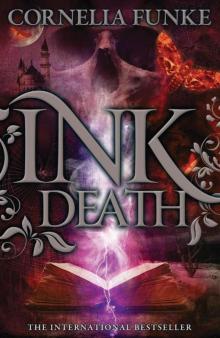 Inkdeath
Inkdeath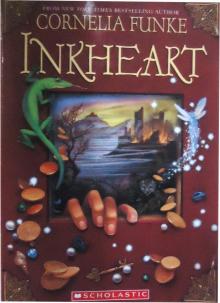 Inkheart
Inkheart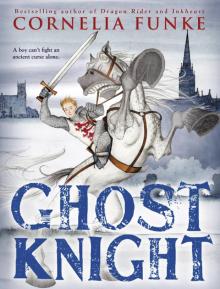 Ghost Knight
Ghost Knight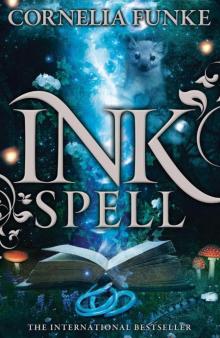 Inkspell
Inkspell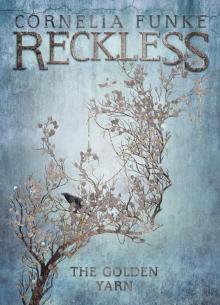 The Golden Yarn
The Golden Yarn Fearless
Fearless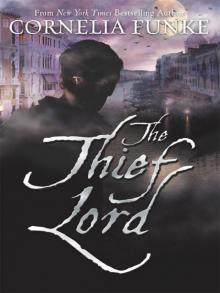 The Thief Lord
The Thief Lord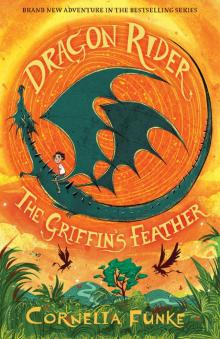 The Griffin's Feather
The Griffin's Feather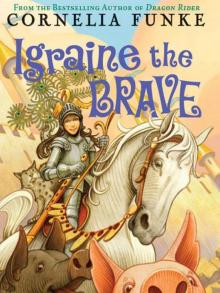 Igraine the Brave
Igraine the Brave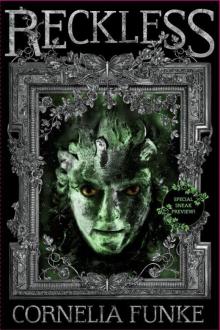 Reckless
Reckless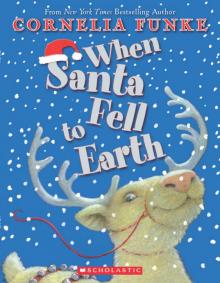 When Santa Fell to Earth
When Santa Fell to Earth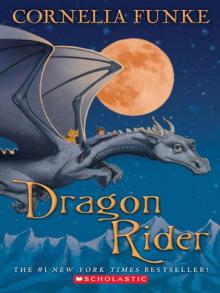 Dragon Rider
Dragon Rider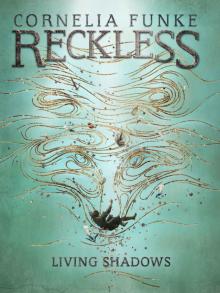 Living Shadows
Living Shadows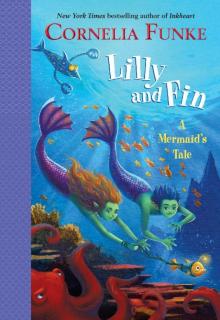 Lilly and Fin: A Mermaid's Tale
Lilly and Fin: A Mermaid's Tale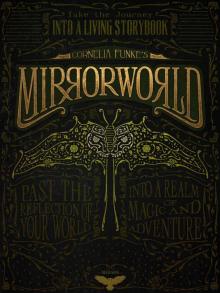 The MirrorWorld Anthology
The MirrorWorld Anthology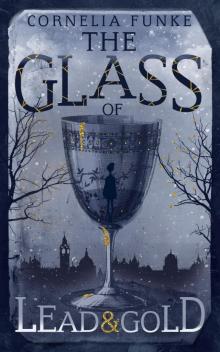 The Glass of Lead and Gold
The Glass of Lead and Gold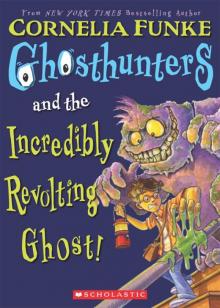 Ghosthunters and the Incredibly Revolting Ghost
Ghosthunters and the Incredibly Revolting Ghost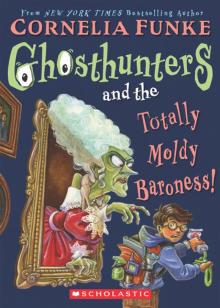 Ghosthunters and the Totally Moldy Baroness!
Ghosthunters and the Totally Moldy Baroness!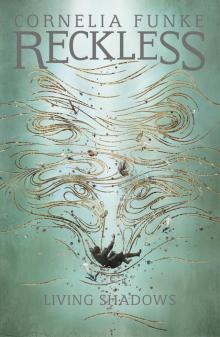 Reckless II
Reckless II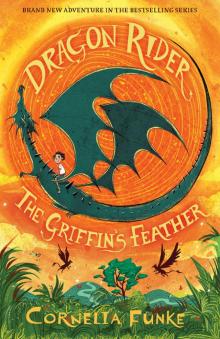 Griffin's Feather
Griffin's Feather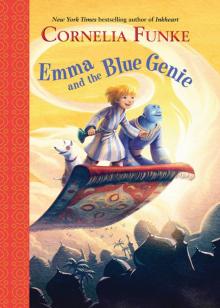 Emma and the Blue Genie
Emma and the Blue Genie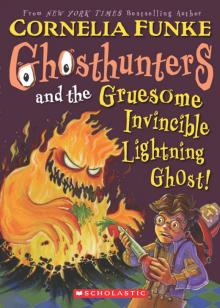 Ghosthunters and the Gruesome Invincible Lightning Ghost
Ghosthunters and the Gruesome Invincible Lightning Ghost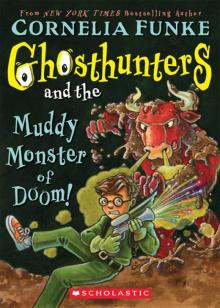 Ghosthunters and the Muddy Monster of Doom!
Ghosthunters and the Muddy Monster of Doom!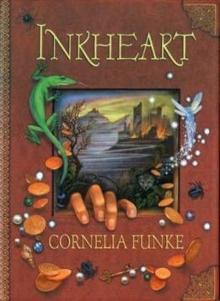 Inkheart ti-1
Inkheart ti-1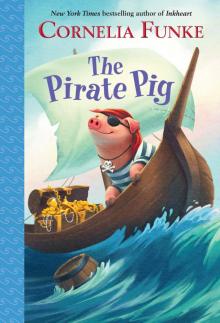 The Pirate Pig
The Pirate Pig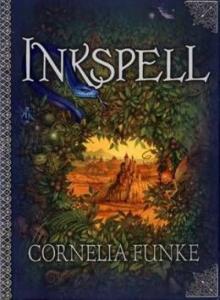 Inkspell ti-2
Inkspell ti-2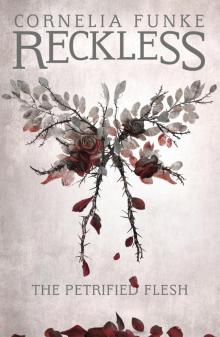 The Petrified Flesh
The Petrified Flesh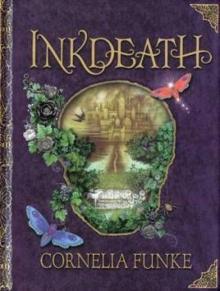 Inkdeath ti-3
Inkdeath ti-3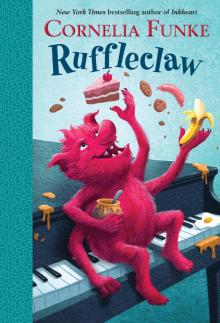 Ruffleclaw
Ruffleclaw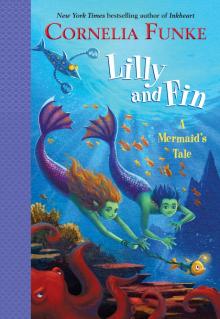 Lilly and Fin
Lilly and Fin